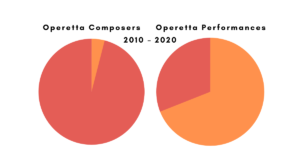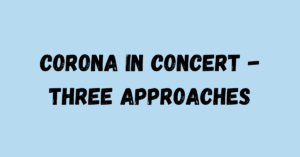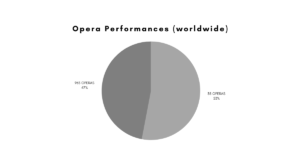Three weeks ago, three approaches to solving the current corona problem in the concert business were presented here in the StarkConductor Blog. Today’s blogpost is dedicated to the world of opera.
What you will read in this article:
There is no doubt that implementing the Corona restrictions in concert operations is already a challenging task. However, the situation is much more difficult in opera. No other art form unites so many individual artistic genres: music, drama, declamation, dance, scenery, costumes, masks… It is this diversity that makes opera so exciting and endearing.
The number of participants in an average opera production is correspondingly large. What you see on stage when you sit in the auditorium is only a small fraction of the whole production. Behind, above and below the stage there are countless people working who you never get to see. These hidden professionals make sure that an opera performance is possible at all.
And now: appearance of the coronavirus. A choral scene in which sixty people on stage represent a brawl in a very confined space? Impossible. (Such scenes exist, for example, in Carmen, a French opera by Georges Bizet, which is one of the most frequently performed works in the repertoire). Place ninety orchestral musicians in the orchestra pit at a safe distance? Good luck.
So the opera houses are really having a hard time at the moment. A lot of innovation is required. The first products of this can already be seen.
Opera on the parking deck
On June 12, the Deutsche Oper Berlin performed Richard Wagner’s opera “Das Rheingold” on a parking deck. 175 people were admitted to the audience, and instead of 80 orchestra musicians, 22 performed a version of the opera for chamber orchestra. The decisive thing: The performance was nevertheless emotionally very touching, as the media reported.
Despite all the restrictions we are currently having to accept due to the corona pandemic, I think the project of the Deutsche Oper Berlin shows one thing very clearly: opera is such an overwhelming art form that it can still have a rousing effect even under the most adverse conditions. I very much hope that we can take this knowledge with us into the post-Corona era.
Streaming Opera
Where a live opera performance is not possible with the best will in the world, technology fortunately still helps: for example, the Opera Philadelphia has created the Opera Philadelphia Channel, through which the coming season of this innovative opera house can be viewed worldwide on TV and streaming devices. It goes without saying that a streamed opera performance cannot replace the live experience. But, as already indicated above: the art form opera is tenacious. Magical opera moments are also possible in the living room at home when streaming.
It remains exciting to see which new formats will be developed by concert and opera houses around the world in the near future. The innovations that will hopefully emerge from this process will also be discussed again here in the StarkConductor Blog.

Jonathan Stark – Conductor
Hello! I'm Jonathan Stark. As a conductor, it is important to me that visits to concerts and operas leave a lasting impression on the audience. Background knowledge helps to achieve this. That's why I blog here about key works of classical music, about composers, about opera and much more that happens in the exciting world of music.






